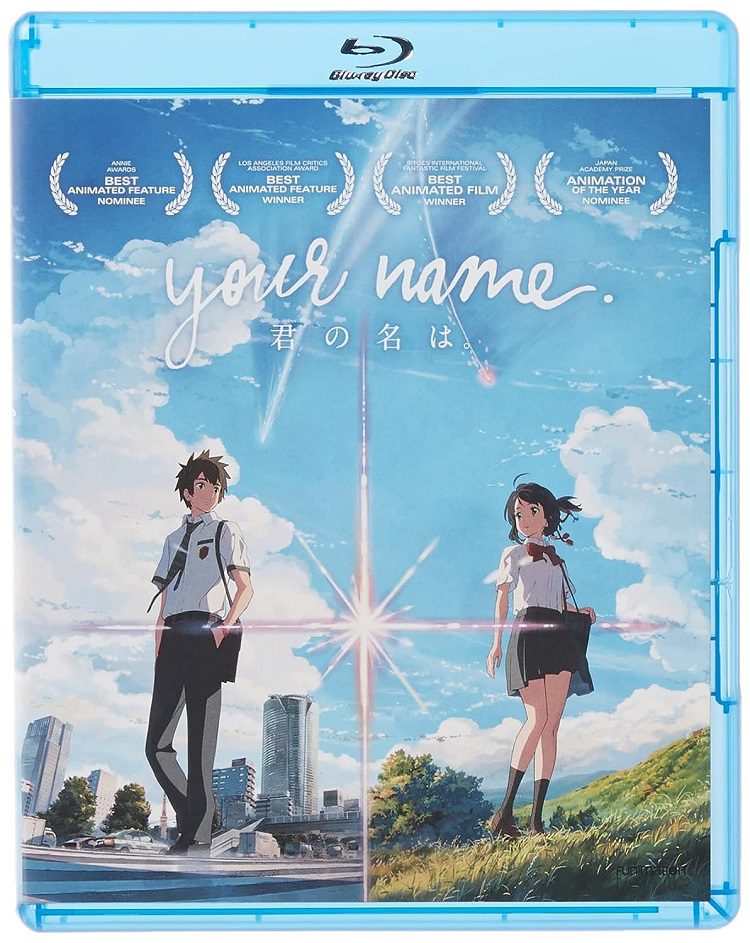
For what is on the surface a sweet, elegiac coming of age romance, Your Name gets pretty ambitious. It starts as a body switching comedy, then becomes a bittersweet time travel mystery, then a thriller and back to the elegiac bittersweetness before it’s done. That is tries this at all is laudable, that it succeeds so well at all of these while never seeming like a confusing mish-mash of ideas is unexpected.
Mitusha is a teenage girl who lives in a small Japanese town where she and her sister help their grandmother keep up rituals at the local shrine. When she wakes up one day after an odd dream, she finds she’s getting funny looks from everyone around her, because of something she’d done yesterday which she can’t remember. Weirder still, someone has written in her school notebook, “Who are you?” After suffering through a day of quotidian small town life and being embarrassed by her classmates while performing a ritual, she yells to the sky, “I hate this town! I hate this life! Please make me a handsome Tokyo boy in my next life!”
The next morning, she wakes up… and is no longer a she. She’s a boy in Tokyo named Taki. And while at first she’s gaping at the city like any yokel would, she soon gets caught up in trying to keep living Taki’s life, do his job, until she goes to sleep, and switches again. This sets up a charming if rather routine comedy, as Taki and Mitusha swap lives seemingly at random after they go to sleep. Taki is much more assertive that Mitusha, brasher and lewder (and, in a running gag, cannot help himself when he wakes up in Mitusha’s body – his hands always go straight for his/her chest.) Meanwhile, Mitusha almost accidentally develops a relationship with Taki’s attractive co-worker at his afternoon job, by being a girl and thus not afraid to talk to her.
They leave each other messages mostly written on their hands and arms, trying to make sure that they don’t mess up each other’s lives too badly. But eventually they fall into a kind of rhythm, and try to help each other – especially Mitusha fixing up Taki’s dating life. And then, one day, the switching stops happening. Taki is cut away from Mitusha, all the more so because after a while he can’t remember whether the switch had ever really happened, or it was a dream. The mystery begins to consume him, until Taki learns that much more than mere distance separated the two.
To go further into the plot would mean divulging secrets that are better discovered in the movie itself. Your Name is the fifth feature length work by Makoto Shinkai, an anime filmmaker who made a splash early on in the scene by producing a 25-minute feature entirely on his own – all the art and animation all put together on his home computer. Since then, with his focus on feature films, it’s been pretty common to see him compared in articles to Miyazaki. In terms of content and style, the comparison is senseless. And until recently, it was nonsense in terms of impact, too, until Your Name became the highest grossing movie of its year in Japan and the fourth highest grossing Japanese box office success of all time (just behind Miyazaki’s Spirited Away). Your Name contains themes of natural disaster which may have resonated with Japanese audiences still living in the shadow of the massive earthquake and tsunami of 2011, but for whatever reason it has been an unprecedented runaway success for the director.
The style of Shinkai’s work has developed on a steady pace from his initial outings, with a focus on realism (within, of course, the rather standard anime paradigm, big eyes, small mouth, and all) combined with science fiction or light fantasy elements. The settings and backgrounds in Your Name sometimes approach almost photo-realism, and the marriage of anime aesthetic with computer graphics, once responsible for a thousand cheap and ugly anime productions, is used to give Your Name‘s camera a remarkable fluidity. It’s a film of often stunning visual beauty.
Shinkai’s visual style and settings are worlds removed from the rounder, more fantastic scenes Miyazaki creates. Another element that formerly separated the directors was emotional impact: Shinkai’s early efforts tended, in my opinion, to assume they were touching rather than achieving resonance. With Your Name, his storytelling is much more assured, and impactful. Even if he occasionally visually oversells the emotion (just because your camera can spin around and around a character shouting at the rim of an enormous crater doesn’t mean you should let it) the sometimes funny, sometimes sad or mysterious story of Taki and Mitusha does a rare thing in modern anime – it really tugs at the heart.
This Friday (April 7, 2017) Your Name is opening in American theaters in a limited engagement. For just the visual beauty alone, anime fans owe themselves to seek it out on the big screen. It’s the rare anime film that has mystery without deliberate obscurity, emotion without becoming (too) maudlin, and action that engages without being overblown. Your Name fulfills the promise of Shinkai’s earlier work, and is a lovely film.